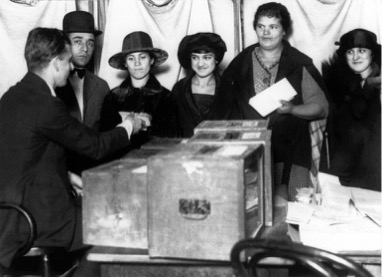
Introduction
Introduction
To think that there was a time when women did not have the right to vote might seem difficult. It might even seem outright absurd. However, once upon a time, this was the case. In fact, it was only starting the late 19thcentury that voting rights for women began to be granted. The women’s suffrage movement has worked tirelessly through the years to grant this right. Its impact is profound. Starting from New Zealand in 1893 to Saudi Arabia in 2015, countries have allowed women to vote.
Therefore, this movement of the right to vote was the beginning of feminism. It’s the first wave of feminism. It was the beginning of the fight for women’s rights. That shows how important it is!
Most importantly, we overlook the importance of women voting. Instead, we take the right for granted and don’t value it enough. Therefore, it is necessary to take a look at why women should vote. For example, we could appreciate the right more through this education.
Why should women have the right to vote?
It is a basic right: Voting is a basic human right. Article 21 of the Universal Declaration of Human Rights states that: “The will of the people shall be the basis of the authority of government; this will shall be expressed in periodic and genuine elections which shall be by universal and equal suffrage and shall be held by secret ballot or by equivalent free voting procedures.”
In short, humans have the right to select their own leaders. They have the right to take part in governing their countries. Why should only one half of the population, men only have this right? The same declaration states that rights should be given to everyone, regardless of differences (Article 2). That is everyone, regardless of gender. That is both women and men.
Laws affect women as much as men: We vote to select leaders and choose the government that will be best for our country. People vote for their rights and beliefs. Our votes contribute towards laws and policies. They affect each and every citizen, despite differences in gender, ethnicity, etc.
Voting is not only a man’s right. Voting is a humanright. Women deserve an equal say. They deserve to take part in forming policies that affect them. Let us take for an example, abortion rights. Women deserve at least an equal (if not more) say in abortion rights. They deserve the right to vote on a policy that affects their own bodies.
Moreover, if women vote, politicians would become more inclusive too. Politicians would make sure they include solutions for women’s issues in their manifestos. They would do this at least to gain the votes of women. If women cannot vote, the picture would be different. Politicians would not be so open to women’s issues. They would only work towards pleasing men and getting their votes. As a result, laws that would better the lives of women would not be passed. Women’s issues would be neglected at policy-making levels.
It would elevate women’s positions in society
Women and their opinions belonged only to their respective households. In society, they did not matter, even though they were a part of it.
However, if women do vote, the scenario would be different. Women would read and research in order to vote, thereby becoming more aware. It would make them more publicly active and even encourage women to run for office!
Women voting would also increase their influence. If women do not vote, they could be treated unfairly. For example, they could be given comparatively miserable wages. If they do vote, they could vote towards establishing minimum wages. Employers and society alike will start respecting women. Women voting would make them a true part of civilization
It would make our society a better place: Women would vote to reform society and amend laws. A woman’s input is equally important to a man’s in building a society. Women could offer a unique perspective on a social issue. Their experiences are different for men. Hence, their opinions may differ too. Different views on an issue could help find more effective solutions.
Women could also help in creating better governments. To win women’s votes, parties would be less willing to endorse candidates of questionable characters. They would avoid known sexual harassers and misogynists. In this way, people of good character and morals would be selected to government. This is how important women voting truly is to society.
Why should not women vote
How do we encourage more women to vote?
Today, almost all countries allow women to vote. However, this does not mean it is easy to do so. Women still face obstacles in voting. Some women still hesitate to vote. In some places, female voter turnouts are relatively low. For example, in the recent Pakistani elections, there were two constituencies where it was <10%.
The most important tool in doing so is education. We must educate and empower more women to vote. A lot of women hesitate to vote because they feel as if their votes do not matter. We must dispel this wrong misconception and let women know that their voices matter. Reinforce that they are crucial in building better communities.
Education starts
Young girls are not the only people who need education. We can educate older, more ‘conservative’ women as well. Let us talk with our grandmothers and make them understand the importance of voting. We should let them know that voting is not a masculine task. Rather, it is a civil duty.
Media could also play a pivotal role in spreading awareness. Media should make documentaries and movies that revolve around this topic. Movies such as Suffragette are an example of this. Newspapers could run more articles on this topic as well.
Men could act as allies too and talk with their misogynist peers about the importance of women voting. They should take part in awareness
Conclusion
The women’s suffrage movement has come a long way. It has spanned years and spread all across the globe. The UK celebrated 100 years of women voting last year. In America, the ratification of the 19thAmendment gave women this right in 1920.
Women have come a long way too. From having been disenfranchised to getting the right to vote. Today, each woman has the right to vote. A couple of generations back, this was not the case. For our grandmothers, or perhaps even our mothers, the right to vote came later in their lives.
Above all, the right to vote has re-defined what it means to be a woman. Before, we used to be secondary to men. We used to be an oppressed group. The right to vote has raised us to an equal pedestal. It has removed us from social and economic inequalities. The right to vote has made us true citizens, just like men. Let us not take this hard-earned right for granted.
Dear fellow women, go vote! Exercise your human right!
About The Author

Layaal Ali is a Maldivian 12th grader currently residing in Malaysia. A staunch feminist, she believes strongly in bringing down the patriarchy. She enjoys reading good books, and writing about women’s rightsCheck out her last blog, Un-Stereotyping Gender!
Photo Credit: http://time.com/4552160/early-suffrage-photos/